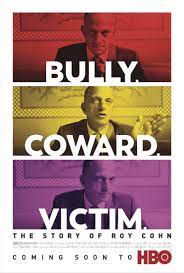
THE STORY OF ROY COHN: BULLY COWARD VICTIM
US, 2019, 91 minutes, Colour.
Directed by Irene Meeropol.
In 2018, a documentary was released, feature-length, Where is My Roy Cohn? It can be seen as complementary to this film. It is the same Roy Cohn so it is expected that there is a great deal of similarity, explanations of Roy Cohn’s background, his early successful career with Senator McCarthy, his anti-Communist fervour, his determination to win at all costs. There is also the story of his downfall and his attack on the Army, and his association with David Schine. There is also the story of his recovery, his links with the Mafia, his legal (and illegal) activities, his sexuality and relationships, his political connections with the Reagan, long support and promotion of Donald Trump, his contracting AIDS, public denials, his death.
This is all present in the current film, perhaps more detail about his finances, his tax avoidance, his manipulation of friends and associates, his planting stories in the media…
Everybody seems to agree that Roy Cohn was a loathsome person, many calling him a personification of evil. There is a great deal of footage from the period, of his activities with Senator McCarthy, of his business and influence associations with Mafia bosses, footage of him with Donald Trump and promoting him. And there are testimonies from Cohn’s biographer, associates, Cindy Adams and media connections, political figures, gay connections, as chauffeur, and his cousin, Don Marcus (with some loathing).
A great deal of attention is shown to the examination of Cohn’s accounts, gifts to his partner, the manipulation of books, and Cohn’s not paying his bills, sailing through an extravagant life. The film also emphasises the gay culture in his life, his frequent presence in the gay community in Provincetown, Massachusetts, eventually buying a house there. There are also his frequent visits, partnership with Steve Rubel, in the night club, 54.
What makes this film distinctive, very distinctive, is the focus on the trial of Julius and Ethel Rosenberg for espionage, secret documents on atomic science to the Russians, the court case, their execution. Cohn expresses absolute conviction that the conviction was correct as was execution.
The film opens with some of footage, one of the Rosenberg sons, Michael, with his children, including his young daughter, Irene, who is the director of this film. The stance of the film is that the trial of the Rosenberg should be re-examined, that there was manipulated testimony, that Cohn worked on the principle of “framing” those who are guilty in order to get the desired verdict. During the 1970s, Michael Meeropol, who had taken the name of his adoptive parents, along with his brother, raised issues questioning the trial, even going on television with Cohn himself. Michael Meeropol is seen in footage of the time, of the 70s, and in older age for this film.
Some of the commentary against this film is from people who are convinced that the Rosenberg’s were guilty, that this is a procommunist film…
Because of the extensive activities of Roy Cohn’s life, there is always a possibility for more and more studies, more and more films about particular facets (for example, his relationship with Donald Trump). Also included in this film are some sequences from the revived stage version of Tony Kushner’s Angels in America, scenes with Nathan Lane portraying Cohn (with some comments from Lane himself as well as Kushner).
Cohn is intriguing and repellent.